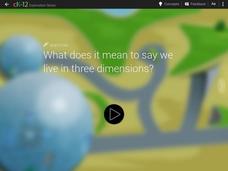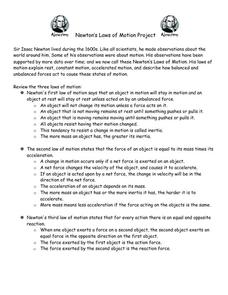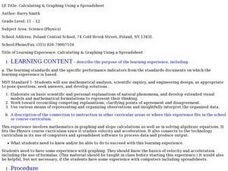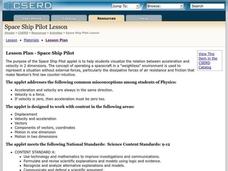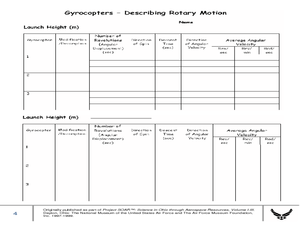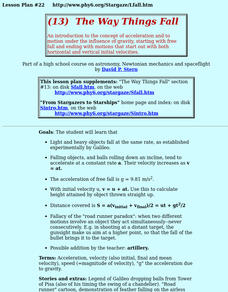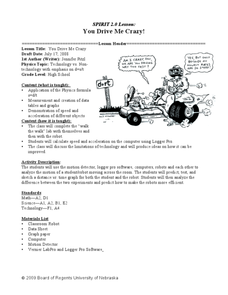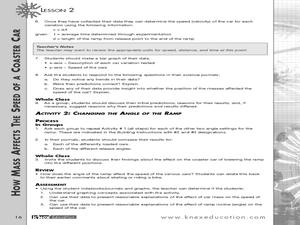Curated OER
Intro to 1D Kinematics with Physlets
Twelfth graders examine illustrations and animations on a Physlets CD in which they must describe motion, analyze graphs, and calculate initial velocity. The Physlet assists in providing active class participation in discussion.
Curated OER
Speed and Distance
In this speed activity, students create time vs. distance graphs to answer questions about average speed, average velocity, and acceleration. This activity has 3 problems to solve.
Curated OER
Motion
In this motion learning exercise, students determine the motion of a ball on different inclined planes, including the velocity and acceleration. This learning exercise has 8 problems to solve.
Curated OER
Simple Machines make work easier.
Students examine how simple machine work can make work easier. In this machines lesson students complete an activity that shows them what makes up a machine, and how to measure displacement and velocity.
Urbana School District
Projectile and Circular Motion, Torque
Introduce your young scholars to the concepts of circular motion, projectile motion, angular speed, simple harmonic motion, torque, center of mass, centripetal force, and Hooke's Law with a 86-slide presentation. The circular motion...
CK-12 Foundation
Irwin 2D
Learners explore two-dimensional motion through visual modeling with an interactive lesson that allows them to control the path of a robot. Graphs show both the horizontal and vertical motion as the robot continues through its...
Sharp School
Newton’s Laws of Motion Project
After a review of all three of Newton's laws, physical scientists complete a choice project. They can create a book in which they collect pictures where the laws of motion are depicted, produce a PowerPoint presentation, or produce a...
Bowels Physics
Impulse and Momentum
Be impulsive with your high school physics class. Emerging physicists review the slide presentation and learn about impulse, momentum, collisions, and how each variable may be affected. They complete practice problems and conclude with a...
NTTI
Vectors: Traveling, But in What Direction
High schoolers watch a video of real-world situations regarding speed, direction, velocity, force, etc. and answer questions while viewing. They then practice drawing and using vectors to solve more real-world problems.
Bowels Physics
Direct and Inverse Relationships
Viewers learn to recognize direct and inverse relationships in the world of physics with a presentation that reveals how to recognize a direct versus an inverse relationship from a formula or graph. After showing basic examples, the...
CK-12 Foundation
Oscillations Simulation
What makes a swing go back and forth like a pendulum rather than going all the way around? Scholars use the simulation to explore pendulums and how they work. They vary the weight, length of the rope, and even gravity in various trials.
Mathematics Vision Project
More Functions, More Features
Learners tackle a wide range of intimidating topics in this comprehensive unit that spans piecewise functions, absolute value of functions, and inverse functions (among other topics). Investigative group work alternates with more...
Curated OER
Calculating & Graphing Using a Spreadsheet
Students use the lab apparatus to calculate the average velocity and average acceleration at several points and record the data. They use the spreadsheets to plot distance vs. time, velocity vs. time and acceleration vs. time graphs.
Curated OER
Space Ship Pilot
Students visualize the relationship between acceleration and velocity as they maneuver a model spaceship in a 2-dimensional applet.
Curated OER
Gyrocopter - Describing Rotary Motion
Learners calculate angular displacement, velocity and acceleration of gyrocopters. In this physics lesson plan, students compare data taken from 3 different gyrocopters. They explain how differences in construction material affect...
Curated OER
Time and Motion on Track
Learners create a motion diagram for a distance and motion project. In this time and motion lesson plan, students take turns walking around the track and take pictures of their motion. Learners measure the distances and...
Curated OER
Projectile Motion Lab
In this physics learning exercise, students model the position, velocity and acceleration using mathematical formulas and a computer program. Then they interpret the parameters in each of the models. Students also complete the experiment...
Curated OER
Circular Motion: Target Practice
Students demonstrate direction of velocity of an object in circular motion. They discuss the mathematical formula, and demonstrate the formula using a string, rubber stopper and a target.
Curated OER
The Way Things Fall
Learners see that light and heavy objects fall at the same rate, as established experimentally by Galileo. They see that falling objects, and balls rolling down an incline, tend to accelerate at a constant rate a. Their velocity...
Curated OER
You Drive Me crazy
Students calculate the distance and acceleration of an object. In this algebra lesson, students collect data and create table and graphs to analyze it. They complete a lab as they collect and analyze data on acceleration and distance.
Curated OER
Motion on an Inclined Plane
For this physics worksheet, learners model the acceleration, velocity, and position of a cart moving up an inclined plane. They take data and determine a pattern in the data. Students also describe their findings and create an illustration.
Curated OER
Study of Projectile Motion using Straw Rockets
Students design and launch their own rockets. In this experimental instructional activity students launch their own rockets and record the various angles and distance that they go. Each student has time to redesign their...
Curated OER
Don’t Sit Under the Apple Tree…You Might Become Famous
Students explore Newton's laws using CEENBoTs. In this physics instructional activity, students collect data and create tables and graphs. They calculate speed, acceleration and forces using mathematical formulas.
Curated OER
How Mass Affects the Speed of a Coaster Car
Students determine what factors affect the speed of the car. In this physics lesson, students calculate speed, velocity and acceleration from experimental data. They construct and interpret motion graphs.







